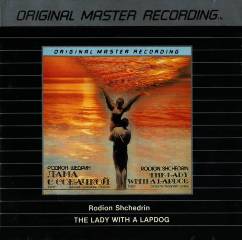Rodion Shchedrin – The Lady with a Lapdog (1986)
Rodion Shchedrin – The Lady with a Lapdog (1986)

1. Dama s sobatchkoi (The Lady with a Lapdog) 47:49 -Yalta -Moscow -Town S. USSR Bolshoi Theatre Orchestra Alexander Lazarev – conductor
Shchedrin's "The Lady with a Lapdog" was written in 1985 as a ballet for his wife, the famous Russian ballerina and choreographer Maya Plisetskaya, which she not only choreographed but danced at the Bolshoi: she was 60 then. It is after a famous short novel by Chekhov, which I took the occasion to read. In typical Chekhov manner, it is about not much, a mismarried man and womaniser who meets and woos a (younger) mismarried woman while both are on an escape trip from their respective spouse in Yalta. She succumbs, they both believe it is only a passing adventure (it is her first), he goes back to Moscow and she to whatever far-off provincial town near Petersburg she lives in, he can't take his mind off of her, after months of agonizing he sets off to meet her, they make up together again, meeting clandestinely in Moscow, and the story just ends there, letting you down kind of in the middle of nowhere. The bitter-sweet atmospheres of Chekhov are a special taste. Maybe it takes more vodka than I can ingest and frost than I get here.
Anyway, Shchedrin's score can be heard not as a ballet and with no reference to its very thin plot - the fact that the CD is NOT cued doesn't help, and quite frankly I have not been able (nor have I tried very hard) to spot where the four next duets/pas de deux begin (the ballet is made up of five) - but rather as "pure" orchestral music.
Heard as such it affords many pleasures. Shchedrin's language is NOT avant-garde. In fact, before reading the liner notes, I had thought it was an early work of his. Those who know Khachaturian's Adagio from his Gayaneh's Ballet (it is the music that Kubrik used in "2001, a Space Odyssey", at the beginning of the part 3, "Jupiter Mission: Eighteen Months Later", aboard spaceship Discovery One) will know what to expect: mournful, burdened, intensely lyrical. Only in a few spots (at 19:25, 30:00, or again 36:00) does the language become more contemporary, anguished and dissonant - but it is mainstream and none-too radical contemporary from the 60s and 70s. Late- rather than early-Penderecki, if you will.
Also, a nice touch is that the scoring is almost for strings alone. Shchedrin only adds the discreet touches of color from two oboes (entering first at 5:02, in a more dance-like and playful mood - bet the two lovers-to-be have just met - soon submerged by an agitated surge from the strings), mournful cor anglais (7:48), crystalline and enigmatic celesta souding like some music box (15:40 - or is it glockenspiel? The liner notes don't even mention it), two French horns (27:15). It ends with the eerie sound of violins playing flageolet-like (harmonics). It would make good film music.
The shortish TT of 47:51 is a drawback, and the price now demanded for this disc - a Mobile Fidelity Sound Lab from the early days of the CD - is definitely another one. Note that it has been reissued by BMG/Melodiya with a filler - but that too is now gone; as I write you can find it under twenty, but I bet it won't be for long (Shchedrin: Lady With the Lapdog, Self Po). If you want it cheap, I see that it has been also reissued on the Zyx label, with no filler(Rodion Shchedrin: The Lady with a Lapdog - and someone has uploaded a photo of cover which is obviously the wrong one). --- Discophage, amazon.com
download (mp3 @320 kbs):
uploaded yandex 4shared mega mediafire zalivalka cloudmailru oboom uplea








